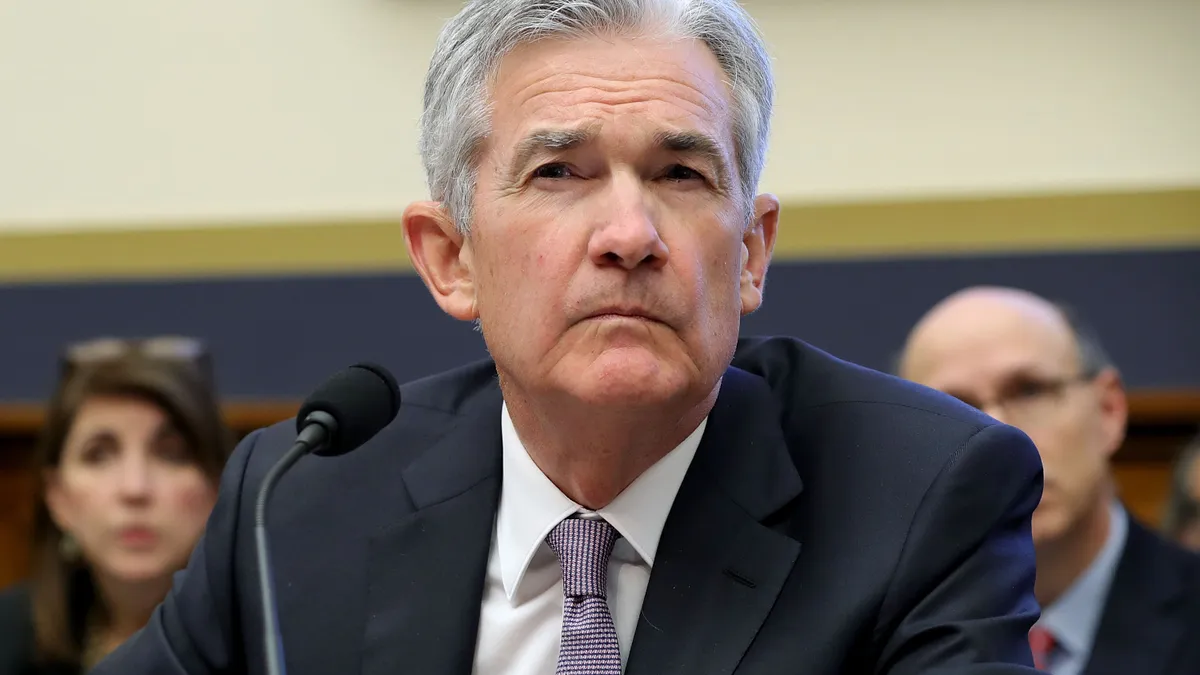Dive Brief:
- Federal Reserve Chair Jerome Powell said failure to curb the highest inflation in 40 years “is not an option” while underscoring that the Fed’s decision Wednesday to raise the main interest rate more than at any time since 1994 presages more aggressive tightening to come.
- The central bank will probably raise the federal funds rate to 3.4% by December and to 3.8% by the end of 2023 before trimming the benchmark to 3.4% by the end of 2024, according to a median of projections by Fed officials. The central bank Wednesday raised the main interest rate 0.75 percentage point to a range between 1.5% and 1.75%,
- “The worst mistake we could make would be to fail, which is not an option,” Powell said, referring to the fight against inflation. “We have to restore price stability, we really do, because it’s the bedrock of the economy.” Policymakers will probably increase the federal funds rate either 0.5 percentage point or 0.75 percentage point at the end of a two-day meeting on July 27, he said at a press conference.
Dive Insight:
Even as Powell pledged more aggressive action, he underscored that the challenge of easing price pressures has grown because of forces beyond the Fed’s control, including persistent supply chain bottlenecks and a surge in commodity prices triggered by Russia’s invasion of Ukraine.
“Inflation has obviously surprised to the upside over the past year and further surprises could be in store,” Powell said, emphasizing his determination to reduce inflation to the Fed’s 2% target.
“Many factors that we don’t control are going to play a very significant role in deciding whether that’s possible or not,” he said. “There’s a path for us to get there — it’s not getting easier, it’s getting more challenging because of these external forces.”
The consumer price index last month exceeded predictions by many economists and increased 8.6% year-over-year in the biggest jump since December 1981.
The central bank seeks to raise borrowing costs enough to reduce price pressures but not so much that it tips the economy into recession. Yet as it steps up the fight against inflation by reducing accommodation, the Fed will have difficulty averting a downturn or “hard landing,” according to former New York Fed President William Dudley.
“Maybe you could pull off a soft landing with unemployment rising a half or three-quarters of a percent, but the historical track record is pretty damning,” Dudley said Tuesday during a webcast hosted by The Wall Street Journal.
The U.S. economy will likely continue growing in the short term but start contracting around mid-2023, he said, adding that a recession may begin six months earlier or later. “A hard landing is very likely,” Dudley said.
Powell voiced confidence in the strength of consumer spending even though data from an index released Friday by the University of Michigan showed that the worsening outlook for inflation has soured consumer sentiment.
The index declined to a record low this month and nearly half of respondents cited inflation as their leading economic concern. Expectations for inflation over the long term hit the highest level since 2008.
The data “was quite eye-catching,” Powell said, and was one reason policymakers increased the main interest rate more than the half percentage point that they signaled as recently as late May. “We take that very seriously.”
Inflation expectations have remained stable for at least three decades, providing a solid foundation for price stability.
“The Fed believes, as the economics profession in general believes, that inflation expectations are very important for the determination of actual inflation,” according to Ellen Meade, former senior policy adviser to the Fed.
“Inflation expectations play a central role in the Fed’s framework, and one of the things they've been saying repeatedly is they absolutely do not want to lose control of inflation expectations,” Meade said during The Wall Street Journal webcast.
Expectations for inflation “have been very well anchored since the late 1990s – at something around 2% slightly above or below – so anything that causes them to fear loss of control there is very important,” she said.
The Fed needs to see some months of falling inflation before it begins to ease its policy tightening, Powell said, noting that inflation slowed last summer only to accelerate thereafter.
“We’re not going to declare victory,” he said, without seeing “compelling evidence that inflation is coming down.”















